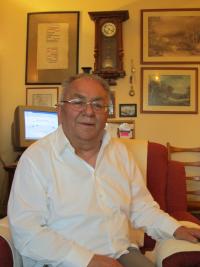Our mother saved us

Download image
Zdravko was born on 7th July in 1939. in a village Donji Jelovac on the hillside of Kozara in today’s Bosnia and Herzegovina. At the beginning of World War II, they were ruled by Independent State of Croatia so many people from his home area joined partisans. He remembers houses dug out in dirt in the forests of Kozara where many families hid. He also remembers the day Ustaše took him, his mother, his brothers and relatives out of one of those houses and deported them to Jasenovac camp. Hunger, cold, sleeping out in the open without bare living minimum, being half-naked; Zdravko, then an eight-year-old, remembers all of that as well stepping onto his own faeces while he was sick with dysentery. He is still impressed by his mother’s courage and the way she kept them together as well as her apron with which she covered them during cold nights in Jasenovac. After a few weeks they were as refugees taken in by a family who helped them get through those hard days. After liberation, they went back to their homeland where his partisan father waited for them. After finishing school and doing military service, the destiny took him to Pula where he remains to this day.
